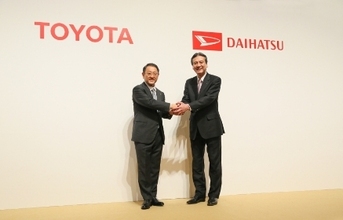
Toyota Motor Corporation (Toyota) and its subsidiary Daihatsu Motor Co., Ltd. (Daihatsu) have reached an agreement whereby Daihatsu will become a wholly-owned subsidiary of Toyota by way of a share exchange (expected to be completed in August 2016).
The purpose of the agreement is to develop of ever-better cars by adopting a unified strategy for the small car segment, under which both companies will be free to focus on their core competencies. Ultimately, this will help Daihatsu and Toyota to attain their joint goal of achieving sustainable growth.
Additionally, the aim of the share exchange is to enhance the value of both brands. Although Toyota and Daihatsu will engage in friendly competition and maintain separate management styles that capitalize on their respective capabilities, bringing the two together under a shared strategy will enable them to jointly overcome otherwise prohibitive obstacles in the future, including resource-intensive undertakings such as the development of next-generation technologies and entry into business areas with growth potential.
Explaining the decision, Toyota President Akio Toyoda said, "This is an opportunity for us both to stop feeling that we need to go it alone, and trust each other to take full advantage of our respective strengths. In other words, we can now focus on our core competencies. That, I believe, is the key to achieving and sustaining global competitiveness."
Daihatsu President Masanori Mitsui commented, "I believe we have now found a course of action that will enable us to continue our growth for the next 100 years. We see this as the perfect opportunity to cement our relationship with Toyota, and, by doing so, to embark on a new period of growth, and to elevate the Daihatsu brand to a global standard."
The key details of the agreement are as follows:
Objective
Under a joint strategy, Toyota and Daihatsu intend to combine their bases of operations in addition to sharing their respective areas of proficiency and technical expertise. This will leverage the advantages of both brands, allowing the development of attractive products that are competitive on a global basis.
(Continued on the next page)



























